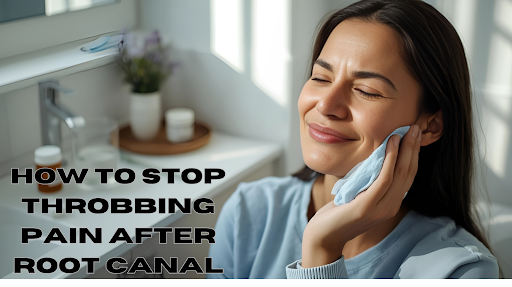How to Stop Throbbing Pain After Root Canal: Your Guide to Medical & Natural Relief
That first sip of cold water without a jolt of agony. The ability to bite down without flinching. A root canal treatment promises relief from the torture of an infected tooth. So, why are you lying on your couch, feeling a persistent, rhythmic thump-thump-thump in your jaw? If you’re searching for how to stop throbbing pain after root canal, take a deep breath. You’re not alone, and this is usually a normal part of the healing process.
This post-surgical discomfort can be unsettling, but it’s your body’s way of launching a full-scale inflammatory response to heal the area. The goal isn’t just to grit your teeth and bear it; it’s to manage it effectively. This comprehensive guide will walk you through both medical interventions and proven natural remedies to help you stop throbbing pain after root canal and get back to your life comfortably and confidently.
Understanding the “Why”: Is Throbbing Pain Normal After a Root Canal?
First things first: let’s demystify the pain. A root canal is a significant procedure. Your endodontist or dentist has meticulously cleaned, disinfected, and sealed the intricate inner chambers of your tooth. To do this, they worked through the delicate ligaments and bone surrounding the root tip.
This manipulation causes localized trauma, leading to inflammation. That throbbing sensation is simply increased blood flow rushing to the area to begin repairs. According to the American Association of Endodontists, some degree of tenderness is normal for a few days.
However, it’s crucial to distinguish normal healing pain from signs of a complication. Normal pain should be manageable with over-the-counter pain relievers and gradually improve each day.
When to Call Your Dentist Immediately:
- Severe pain that isn’t relieved by prescribed medication.
- Visible swelling (outside or inside the mouth) that worsens after 48 hours.
- A return of pain after it had initially subsided.
- Signs of infection, such as fever, pus, or a bad taste in your mouth.
If you experience any of these, contact your dentist right away. For now, let’s focus on the standard strategies for how to stop throbbing pain after root canal recovery.
The Medical Arsenal: Fast-Acting Pain Relief
When the throbbing is intense, reaching for medically-proven solutions is your best bet for quick and effective relief. Here’s a breakdown of your options.
Also Read This : How to Stop Throbbing Pain After Root Canal
1. Over-the-Counter (OTC) Pain Medication
This is your first line of defence. The most effective approach often involves a one-two punch against pain and inflammation.
- Ibuprofen (Advil, Motrin): As a non-steroidal anti-inflammatory drug (NSAID), ibuprofen is excellent for reducing the inflammation that causes the throbbing sensation. It directly targets the source of the pain.
- Acetaminophen (Tylenol): This analgesic is great for blocking pain signals but doesn’t reduce inflammation. It’s a good alternative if you can’t take NSAIDs.
Pro Tip: Many dentists recommend alternating ibuprofen and acetaminophen (e.g., taking ibuprofen, then three hours later taking acetaminophen, and so on). This method can provide more consistent relief. Always consult your dentist or doctor before starting any new medication regimen.
2. Prescription Medications
If your pain is more severe, your dentist might prescribe something stronger.
- Prescription-Strength NSAIDs: A higher dose of an anti-inflammatory.
- Narcotic Pain Relievers: These are typically reserved for extreme cases due to their potential for side effects and addiction. They are powerful but should be used with caution and only as directed.
3. Antibiotics: Only If Necessary
It’s important to note that antibiotics are not pain relievers. They are only prescribed if there is a pre-existing infection that needs to be cleared up. The pain relief will come from the actual root canal procedure and anti-inflammatories.
| Method | How It Helps | Best For |
| Ibuprofen (OTC) | Reduces inflammation at the source | Managing throbbing and swelling |
| Acetaminophen (OTC) | Blocks pain signals in the brain | General pain relief if NSAIDs aren’t an option |
| Alternating Ibuprofen & Acetaminophen | Attacks pain from two angles | Strong, consistent relief for moderate pain |
| Prescription Medication | Powerful pain blockade | Severe, unmanageable post-operative pain |
Soothing the Throb: Natural and At-Home Remedies
While medication tackles the chemical side of pain, natural remedies can provide wonderful complementary relief and comfort. Learning how to stop throbbing pain after root canal naturally is about supporting your body’s healing process.
1. The Magic of Cold Compresses
This is arguably the most effective natural remedy for the first 24-36 hours. Applying a cold pack to the outside of your cheek constricts blood vessels, which reduces blood flow to the area. This directly counteracts the throbbing and helps minimize swelling.
- How to do it: Apply an ice pack wrapped in a thin towel to your cheek for 15-20 minutes at a time. Take a 20-minute break, and then reapply.
2. Salt Water Rinses: Nature’s Antiseptic
After the first 24 hours, gentle salt water rinses can work wonders. The warm salt water helps soothe inflamed tissues, promotes healing, and keeps the area clean by flushing out food particles.
- How to do it: Dissolve half a teaspoon of salt in a glass of warm water. Gently swish it around the affected side for about 30 seconds and spit. Do this 2-3 times a day, especially after eating.
3. Elevation is Key
When you lie down, blood pressure in your head increases, which can intensify that throbbing sensation. This is a simple yet highly effective trick to stop throbbing pain after root canal discomfort, especially at night.
- How to do it: Prop yourself up with an extra pillow or two when you sleep or rest. Keeping your head elevated above your heart helps reduce pressure and swelling.
4. Soft Foods and Proper Nutrition
What you eat plays a role. Stick to soft, lukewarm, or cool foods for the first few days. Avoid chewing on the side of the treated tooth.
- Good choices: Yogurt, smoothies, mashed potatoes, soup, applesauce, scrambled eggs.
- Avoid: Crunchy, hard, spicy, or very hot foods that can irritate the area.
5. Rest and Relaxation
Your body heals best when it’s at rest. Avoid strenuous activity for a couple of days after the procedure. Elevated heart rate from exercise can increase blood flow and, you guessed it, throbbing. Give yourself permission to relax.
Also Read More :How to Reduce Gap Between Teeth Naturally at Home
What to Avoid: Common Pitfalls That Increase Pain

Knowing what not to do is just as important as knowing what to do when figuring out how to stop throbbing pain after root canal.
- Don’t use straws: The suction pressure can dislodge the blood clot that’s forming and hinder healing.
- Don’t smoke: Smoking severely restricts blood flow, dramatically slowing down the healing process and increasing the risk of a painful condition called dry socket.
- Don’t poke the area: Avoid touching the tooth with your tongue or finger, and be very gentle when brushing around it.
Final Thoughts: Your Path to a Pain-Free Smile
A throbbing sensation after a root canal is typically a short-lived chapter in your journey to a healthy, pain-free mouth. By combining medically-sound strategies with gentle, supportive natural remedies, you have a powerful toolkit to manage your recovery effectively.
The key is to act proactively. Don’t wait for the pain to become severe. Start with OTC anti-inflammatories as recommended by your dentist and use cold compresses immediately. Be patient with your body—it’s doing important work.
We hope this guide has given you a clear and confident path for how to stop throbbing pain after root canal treatment. Remember, your dentist is your best resource, so never hesitate to pick up the phone if your recovery doesn’t feel right.
FAQs: Managing Discomfort After Your Root Canal
How long should I expect the throbbing pain to last after a root canal?
It’s normal to experience some throbbing pain or tenderness for the first 24 to 72 hours after the procedure. This is the peak of the inflammatory response as your body begins to heal. The discomfort should gradually decrease each day and be manageable with over-the-counter pain relievers. If the severe throbbing pain after your root canal persists beyond a few days or suddenly gets worse, it’s important to contact your dentist, as this could signal a complication.
I’m allergic to ibuprofen. What’s the best way for me to stop throbbing pain after a root canal?
If you cannot take NSAIDs like ibuprofen, your best medical option is acetaminophen (Tylenol). While it doesn’t reduce inflammation, it is very effective at blocking pain signals. You can enhance its effects by diligently using the natural methods discussed: consistent cold compresses for the first day, gentle salt water rinses after 24 hours, and keeping your head elevated. Your dentist may also be able to suggest a prescription alternative that is safe for you.
Is it a bad sign if I feel no pain at all after my root canal?
Not at all! In fact, it’s a great sign. Everyone’s pain threshold and body’s inflammatory response are different. Many patients experience only mild soreness, similar to a small bruise, or even no pain whatsoever. The absence of pain simply means your body is handling the healing process very well. The information on how to stop throbbing pain after root canal is there just in case you need it.
Can a warm compress help me stop the throbbing pain?
Timing is critical. For the first 24-36 hours, you should only use a cold compress to reduce swelling and numb the throbbing. After about 48 hours, if you still feel a deep, muscular stiffness in your jaw, a warm compress can be beneficial. The warmth helps relax the muscles and increase blood flow to promote further healing. Never apply heat to a new surgical site, as it can increase inflammation.
Why does the pain throb more when I lie down, and how can I stop it?
This is a very common experience. When you lie flat, the blood pressure to your head and jaw increases. This extra pressure in the already-inflamed tissues around your tooth root amplifies the throbbing sensation. The simplest and most effective way to stop throbbing pain after root canal at night is to sleep with your head elevated on an extra pillow or two. This uses gravity to your advantage, reducing blood pressure in the area and providing significant relief.

